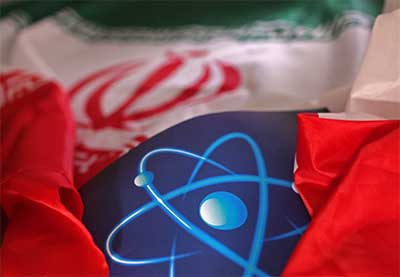Date : 17/06/2023
Relevance – GS Paper 2 - International Relations
Key Words: Nuclear arrangement, pre-emptive military action, Joint Comprehensive Plan of Action, ballistic missile development,
Context –
- Interactions between American and Iranian diplomats have recently been made public, indicating progress in talks between the two countries.
- The Foreign Minister of Oman, Sayyid Badr Albusaidi, confirmed the ongoing negotiations regarding the release of American prisoners in Iran and a fresh deal on the nuclear issue.
- Iranian officials also acknowledged indirect talks with the United States in Muscat. This article delves into the details and implications of the proposed nuclear arrangement.
What is the Iran Nuclear Deal –
- The Iran Nuclear Deal, formally known as Joint Comprehensive Plan of Action (JCPOA) is an agreement on the Iranian nuclear program reached in Vienna on 14 July 2015, between Iran and the P5+1 (the five permanent members of the United Nations Security Council—China, France, Russia, United Kingdom, United States—plus Germany).
- The Iran Nuclear Deal has often been in the news from time to time, primarily focusing on the frosty relationship between Iran and the United States.
- Although the Iran Nuclear Deal was stalled under US President Trump in 2018, the new President Joe Biden has expressed interest in reviving the JCPOA following an announcement in May 2021.
Details of the Nuclear Arrangement:
- Following the visit of Brett McGurk, the White House Coordinator for the Middle East and North Africa, to Oman in May, Sultan Haitham bin Tariq Al Said visited Tehran, possibly carrying a message from the U.S. for Iran's Supreme Leader Ayatollah Ali Khamenei. Ayatollah Khamenei publicly addressed the matter, emphasizing the need for a new agreement that would preserve Iran's nuclear infrastructure while affirming the country's commitment to the International Atomic Energy Agency (IAEA) inspectors.
- Reports suggest that the expected agreement, set to be finalized in a few weeks, will be informal and unwritten.
- Israel's Prime Minister, Benjamin Netanyahu, referred to it as a "mini-agreement," while Iranian officials see it as a "political ceasefire."
- The key elements of the arrangement include Iran freezing its nuclear enrichment at 60%, refraining from attacking U.S. military contractors in Syria and Iraq, improving cooperation with IAEA inspectors, ceasing the provision of ballistic missiles to Russia, and releasing three U.S. citizens held in Iran.
- In return, the U.S. has pledged to avoid imposing new harsh sanctions on Iran, refrain from seizing oil tankers in the Gulf waters, and abstain from pursuing anti-Iran resolutions in the United Nations.
- Additionally, the U.S. is expected to unfreeze Iran's bank accounts worth around $80 billion held in various banks outside the country, along with facilitating the immediate release of $7 billion in South Korea and $2.7 billion in Iraq.
American Interests:
- The informal nature of the agreement means that the Joe Biden administration does not need to seek Congressional approval.
- Furthermore, since it does not involve easing existing U.S. sanctions, Republicans will face challenges in criticizing the deal during the upcoming presidential campaign.
- The U.S. acknowledges that the original Joint Comprehensive Plan of Action (Iran nuclear deal) cannot be revived in its previous form.
- There are demands for a broader agreement that addresses Iran's ballistic missile development, regional influence, and support for terrorism—areas where little progress is expected. U.S. officials also recognize the diminishing effectiveness of sanctions in influencing Iran's response to American pressure.
Focus of the Proposed Arrangement:
- The proposed arrangement primarily addresses concerns regarding Iran's uranium enrichment program, which had reached 84%, and its stockpile of installed centrifuges.
- The U.S. military estimated that Iran was just "several months" away from obtaining a nuclear weapon, while Israeli sources believed it would take one to two years.
- Iran's progress toward acquiring a weapon raised significant concerns about a potential regional conflict, with Israel expected to take pre-emptive military action with or without U.S. involvement.
Implications and Ground Realities:
- Israeli Prime Minister Netanyahu stated that Israel would not be bound by this arrangement.
- However, given the reduced influence of the current Israeli government and their anti-democratic initiatives, it is unlikely they will garner backing in Washington to overturn the deal.
Conclusion –
Iran enters into the arrangement with no illusions about its long-term value. At best, it will survive the present Biden administration. Nevertheless, the agreement will release billions of dollars, which Iran can utilize to improve the living conditions of its citizens. Iran will also be able to continue selling some.
Probable Questions For Mains Exam-
- Question 1– What is the informal nuclear arrangement between Iran and USA and what are its key details? Also mention the implications of the proposed nuclear arrangement between Iran and the United States? (10 marks, 150 words)
- Question 2 - What are the key focuses of the proposed nuclear arrangement and how do they address concerns regarding Iran's nuclear program? How does the proposed nuclear arrangement impact Iran's access to frozen funds and potential improvements in the living conditions of its citizens? ( 15 marks, 250 words)
Source– The Hindu






















